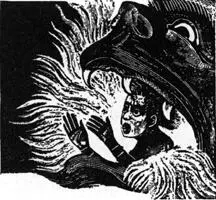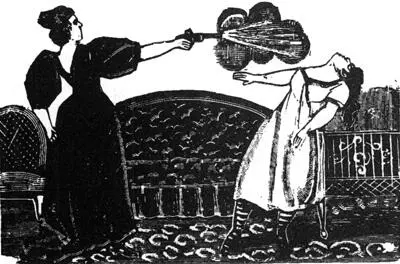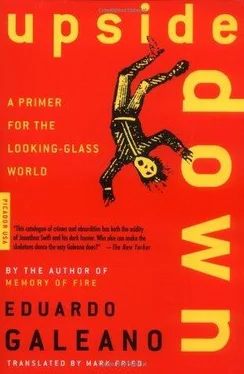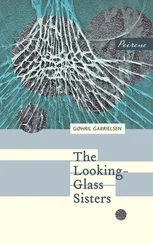“Get rid of them?”
“That’s right.”

Under contract to store owners, the death squads in Brazil, which like to call themselves “self-defense groups,” clean up the cities while in the countryside their colleagues under contract to big landowners gun down landless peasants and other bothersome people. According to the May 20, 1998, issue of Isto é magazine, in the state of Maranhão the life of a judge is worth five hundred dollars, that of a priest four hundred. It’s only three hundred to knock off a lawyer. Murderers for hire offer their services by Internet, with discounts for subscribers.
Public Enemy/1
In April 1997, Brazilian television viewers were invited to vote on the fate of a young perpetrator of a violent assault. Execution won by a landslide, two to one over prison.
According to researcher Vera Malaguti, the image of public enemy number one is modeled on a great-grandchild of slaves who lives in the favelas, can’t read, adores “funk” music, uses or sells drugs, is arrogant and pushy, and fails to show the least remorse.
Death squads in Colombia — known officially as “self-defense groups,” they call themselves “social cleansing groups”—also began by killing guerrillas and now, under contract to store owners, landowners, or whoever will pay, they’ll kill anyone. Many of their members are policemen or soldiers without uniform, but they also train young executioners. In Medellín, several schools for hit men attract teenagers with offers of easy money and cheap thrills. These fifteen-year-olds trained in the arts of crime are sometimes hired to kill other children as dead of hunger as they are. Poor against poor, as usual: poverty is a blanket that’s too narrow, and everyone pulls it to his own side. But the victims might also be prominent politicians or famous journalists. The chosen target is called a “dog” or a “package.” The young assassins get paid according to the importance of the dog and the risks of the operation. Often the executioners are protected by the legal mask of security companies. At the end of 1997, the Colombian government acknowledged that it had only thirty inspectors for three thousand private security firms. Last year in an exemplary operation that lasted a week, one agent inspected four hundred “self-defense groups.” He found nothing out of the ordinary.
Public Enemy/2
At the beginning of 1998, journalist Samuel Blixen made an eloquent comparison. The take from fifty muggings carried out by the best-known criminal gangs in Uruguay added up to $5 million. The take from two muggings carried out without a shot by a bank and a financier totaled $70 million.
Death squads leave no fingerprints. Rarely is the silence broken. An exception occurred in Colombia in mid-1991: sixty beggars were shot dead in the city of Pereira. The murderers weren’t arrested, but fifteen police officers, two of high rank, were “disciplined” and forced to retire. Another exception occurred in Rio de Janeiro in mid-1993: fifty homeless children sleeping at the gates of Candelaria Church were shot; eight of them died. The massacre was news around the world and, in the end, two of the military police who carried out the operation went to jail. A miracle.
Afanásio Jazadji was elected to the legislature with the largest vote in the history of the state of São Paulo. He earned his popularity preaching on the radio, day after day, microphone in hand. Enough talk of problems, he said, it’s time for solutions. Overcrowded jails? “We should take all those incorrigible prisoners, put them up against the wall, and incinerate them with a flamethrower. Or set off a bomb. Boom. Problem solved. Those bums are costing us millions.” Interviewed in 1987 by Bell Chevigny, Jazadji explained that torture is okay because the police torture only the guilty. Sometimes, he said, the police don’t know what crimes the crook has committed and can find out only by beating him, just like a husband when he beats his wife. Torture, he concluded, is the only way to discover the truth.
Back in the year 1252 Pope Innocent IV authorized the torture of those suspected of heresy. The Inquisition invented new techniques for the production of pain, which twentieth-century technology has elevated to industrial perfection. Amnesty International has documented the systematic practice of electric-shock torture in fifty countries. In the thirteenth century the powerful called a spade a spade; now torture is committed but not discussed. Power avoids bad words. At the end of 1996, when the Israeli Supreme Court authorized the torture of Palestinian prisoners, the justices called it “moderate physical pressure.” In Latin America torture is called “legal compulsion.” Common criminals, or those who look like them, have always suffered “compulsion” in the police stations here. It’s a custom, considered normal, for the police to extract confessions by the same means of torment that military dictatorships recently used on political prisoners. The difference is that many of those political prisoners were middle-class, some upper-class, and social class is the only boundary impunity occasionally acknowledges. During the military horror, campaigns by human rights groups didn’t always ring like a wooden bell; sometimes they struck a chord in the closed environment of life under dictatorship and even in the world beyond. Who, in contrast, will listen to common criminals, socially despised and legally invisible? When one of them commits insanity by announcing that he’s been tortured, the police send him back for more intensive care.

Filthy jails, prisoners like sardines in a can — most of them have not been convicted, many haven’t even been tried. They’re just there and nobody knows why. Compared with these seething prisons, Dante’s Inferno looks like Disneyland. Riots break out continually, and the forces of order spray the disorderly with bullets, in the process killing as many as they can to ease the overcrowding. In 1992, there were over fifty uprisings in Latin America’s most overcrowded prisons. Nine hundred were killed, most of them in cold blood.
Thanks to torture, which makes the mute sing, many are imprisoned for crimes they did not commit, since it’s better to have an innocent behind bars than a criminal walking free. Others confess to murders that are child’s play compared with the feats of certain generals or to robberies that are jokes compared with the frauds run by businessmen and bankers or the commissions charged by politicians every time they sell off another piece of the country. The military dictatorships are gone, but the jails of Latin America’s democracies are filled to bursting. The prisoners are poor, as you’d expect, because only the poor go to jail in countries where nobody goes to jail for the collapse of a brand-new bridge, the bankruptcy of a looted bank, or the crumbling of a building with no foundation.

The system of power that creates poverty is the same one that wages war without quarter on the desperate people it begets. A century ago, Georges Vacher de Lapouge demanded more guillotines to purify the race. This French thinker, who believed that all geniuses were German, was convinced that only the guillotine could correct the errors of “natural selection” and end the alarming proliferation of incompetents and criminals. “A good crook is a dead crook,” say those who today demand ironhanded social therapy. Society has the right to kill in legitimate defense of public health, given the danger posed by slums infected with ne’er-do-wells and drug addicts. With social problems reduced to police problems, there is a growing clamor for the death penalty, a fair punishment that will reduce the cost of prisons, have a healthy, intimidating effect, and solve the problem of recidivism by eliminating potential repeat offenders. You learn by dying. In most Latin American countries the law does not allow capital punishment, but it gets carried out every time a police warning shot enters the back of a suspect’s neck or death squads kill with impunity. With or without the law, the state practices premeditated homicide, treachery, and discrimination. Yet no matter how many people the state kills, it can’t seem to do a thing about the no-man’s-land the street has become.
Читать дальше














